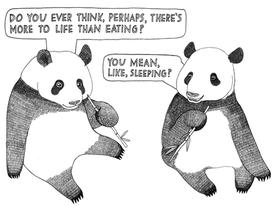Why Can't I Skip Breakfast?
Options
Replies
-
Yes, even in a calorie deficit. Your body doesn't operate on a "24-hour diet clock" that magically resets at midnight. Enzymes and hormones are produced throughout the day in response to what you are eating or not eating, it doesn't just total everything up at midnight and reset for the next day. If you put your body in a constant "famine-then-feast" situation, it will adapt and begin to simply store the calories you ate for dinner as fat if you don't need them right away. Your body doesn't just let all those absorbed calories float around in your blood all night, insulin is produced and what you don't utilize is converted to fat and stored. She asked if it mattered, and research says it does.
But if you don't agree with me that is fine too. I look at research, I have a degree in Human Nutrition and am obtaining my Masters in Obesity Prevention and Management, but what the heck do I know? Quoting Fargo "I'm not gonna debate you Jerry...."
So let's assume it gets converted to fat which then gets burned right off the same or next day due to your on going activity. The long term problem is what exactly?0 -
Yes, even in a calorie deficit. Your body doesn't operate on a "24-hour diet clock" that magically resets at midnight. Enzymes and hormones are produced throughout the day in response to what you are eating or not eating, it doesn't just total everything up at midnight and reset for the next day. If you put your body in a constant "famine-then-feast" situation, it will adapt and begin to simply store the calories you ate for dinner as fat if you don't need them right away. Your body doesn't just let all those absorbed calories float around in your blood all night, insulin is produced and what you don't utilize is converted to fat and stored. She asked if it mattered, and research says it does.
But if you don't agree with me that is fine too. I look at research, I have a degree in Human Nutrition and am obtaining my Masters in Obesity Prevention and Management, but what the heck do I know? Quoting Fargo "I'm not gonna debate you Jerry...."
Let me ask you this...why do athletes carb-load the night before an event?0 -
Yes, even in a calorie deficit. Your body doesn't operate on a "24-hour diet clock" that magically resets at midnight. Enzymes and hormones are produced throughout the day in response to what you are eating or not eating, it doesn't just total everything up at midnight and reset for the next day. If you put your body in a constant "famine-then-feast" situation, it will adapt and begin to simply store the calories you ate for dinner as fat if you don't need them right away. Your body doesn't just let all those absorbed calories float around in your blood all night, insulin is produced and what you don't utilize is converted to fat and stored. She asked if it mattered, and research says it does.
But if you don't agree with me that is fine too. I look at research, I have a degree in Human Nutrition and am obtaining my Masters in Obesity Prevention and Management, but what the heck do I know? Quoting Fargo "I'm not gonna debate you Jerry...."
Let me ask you this...why do athletes carb-load the night before an event?
To restore glycogen levels in the muscles!
Anything above and beyond that is not of use - which is why athletes will only eat the carbs they need to replenish what they have used.0 -
Yes, even in a calorie deficit. Your body doesn't operate on a "24-hour diet clock" that magically resets at midnight. Enzymes and hormones are produced throughout the day in response to what you are eating or not eating, it doesn't just total everything up at midnight and reset for the next day. If you put your body in a constant "famine-then-feast" situation, it will adapt and begin to simply store the calories you ate for dinner as fat if you don't need them right away. Your body doesn't just let all those absorbed calories float around in your blood all night, insulin is produced and what you don't utilize is converted to fat and stored. She asked if it mattered, and research says it does.
But if you don't agree with me that is fine too. I look at research, I have a degree in Human Nutrition and am obtaining my Masters in Obesity Prevention and Management, but what the heck do I know? Quoting Fargo "I'm not gonna debate you Jerry...."
Let me ask you this...why do athletes carb-load the night before an event?
To restore glycogen levels in the muscles!
Anything above and beyond that is not of use - which is why athletes will only eat the carbs they need to replenish what they have used.
Yeah, and it works pretty well for them, doesn't it!0 -
Skip it if it works for you.
Usually my first meal of the day is brunch, that sounds weird... But I really cannot eat before 10am without feeling sick. So I usually have something light which is almost like lunch at around 11-12pm.0 -
Rubbish that you need to eat breakfast. Everyone is different. I don't eat breakfast, I am not hungry in the mornings and like the poster, I appreciate my extra points in the evening. If I eat early in the day, it seems to give me more of an appetite and so I want to eat more.0
-
Skipping breakfast makes you more tired throughout the day and slows down your metabolism. Your body goes into starvation mode because it has no idea when it's getting food next and then when you do eat it stores as much fat and sugar as possible because it's (again) not sure when it's going to get food next. If you want extra calories for dinner, try a simple workout. I walk each day for 45 minutes with my dog. That gives me 241 extra calories to use
 Cleaning your house, gardening, ect all add up.Breakfast is really the most important meal of the day. I was never able to get food down when i woke up, but I simply was not hungry. You have to find what works for you. Even if you start your day with a simple protein shake, it is better than nothing. Breakfast fuels your body throughout the day. It kick starts your metabolism, and sets the pace for the rest of the day. If you do not eat breakfast, your metabolism slows and your body begins "starvation mode". You also will begin to feel sluggish by afternoon. It gives you energy, and keeps you going throughout the day. If you are worried about calories for dinner, perform 30-40 minutes of exercise to have some extra calories !I fnd it disturbing how many people think that not eating for 12hrs or longer is ok.
Cleaning your house, gardening, ect all add up.Breakfast is really the most important meal of the day. I was never able to get food down when i woke up, but I simply was not hungry. You have to find what works for you. Even if you start your day with a simple protein shake, it is better than nothing. Breakfast fuels your body throughout the day. It kick starts your metabolism, and sets the pace for the rest of the day. If you do not eat breakfast, your metabolism slows and your body begins "starvation mode". You also will begin to feel sluggish by afternoon. It gives you energy, and keeps you going throughout the day. If you are worried about calories for dinner, perform 30-40 minutes of exercise to have some extra calories !I fnd it disturbing how many people think that not eating for 12hrs or longer is ok.
Per my certified personal trainer........eat breakfast! You need to kick start your metabolism when you get up. Not eating at regular intervals brings down your metabolism. When your body doesn't know when it's next fueling is going to be it will hold onto what it does get creating fat. 0
0 -
Why Can't I Skip Breakfast?
Starving people all over the world wonder why most people can't skip a meal to help them.0 -
My God....I can see how people on MFP get frustrated trying to dispell these dieting myths. HOW MANY WAYS CAN IT BE SAID??
*SMH* I'm so, sorry...I can't even...
Sadly, some people don't know how to science. Or read. I think there are quite a few people on this thread who need to learn how to read. They seem to have forgotten that important skill.0 -
Of course you can skip breakfast. When I was working I had to be at the office by 6:30 and was never hungry before ten or eleven, so I didn't eat breakfast. All that matters is total calories for the day, not when you eat them.0
-
Can somebody define "breakfast" for me? Thanks.0
-
Can somebody define "breakfast" for me? Thanks.
Teehee. We Typically associate it with around the time we wake but by definition I do believe it's when we break out fast from sleep. Which is whenever we want Right? Please say I's right:flowerforyou: 0
Right? Please say I's right:flowerforyou: 0 -
Because you will get an F at life!
nah, skip breakfast if you want, it doesn't matter.0 -
Am I the only one in this thread that can eat your "breakfast" foods every meal?
Bagels, eggs, bacon, cereal, pancakes, waffles, etc......I've been known to have pancakes for dinner. Yum.
that's how I grew up, pancakes... all the time.. which explains how I got fat hahaha0 -
Generally the benefit is that it keeps your metabolism active throughout the day. This is why they recommend that you have 5 meals a day. I used to never eat breakfast because I was always stayed up late and woke up minutes before school. Now that I graduated college and can make my own schedule I've found that eating in the morning even when I am not hungry limits my hunger urges later in the day. If I didn't have breakfast I would normally have a large lunch because I would fell hungry. We're all different and it may not apply to you, but for me it is a lot easier to make a healthy choice when I don't feel hungry.
Who are "they"?
"They" refer to the numerous military dietitians and nutritionist medical doctors I have talked to throughout my lifetime. The conversations were had under the context of developing healthier eating habits not necessarily weight loss so they may have been considering other factors that contribute to wellness than simply weight.0
Categories
- All Categories
- 1.4M Health, Wellness and Goals
- 391.6K Introduce Yourself
- 43.5K Getting Started
- 259.7K Health and Weight Loss
- 175.6K Food and Nutrition
- 47.3K Recipes
- 232.3K Fitness and Exercise
- 393 Sleep, Mindfulness and Overall Wellness
- 6.4K Goal: Maintaining Weight
- 8.5K Goal: Gaining Weight and Body Building
- 152.7K Motivation and Support
- 7.8K Challenges
- 1.3K Debate Club
- 96.3K Chit-Chat
- 2.5K Fun and Games
- 3.3K MyFitnessPal Information
- 23 News and Announcements
- 938 Feature Suggestions and Ideas
- 2.3K MyFitnessPal Tech Support Questions











